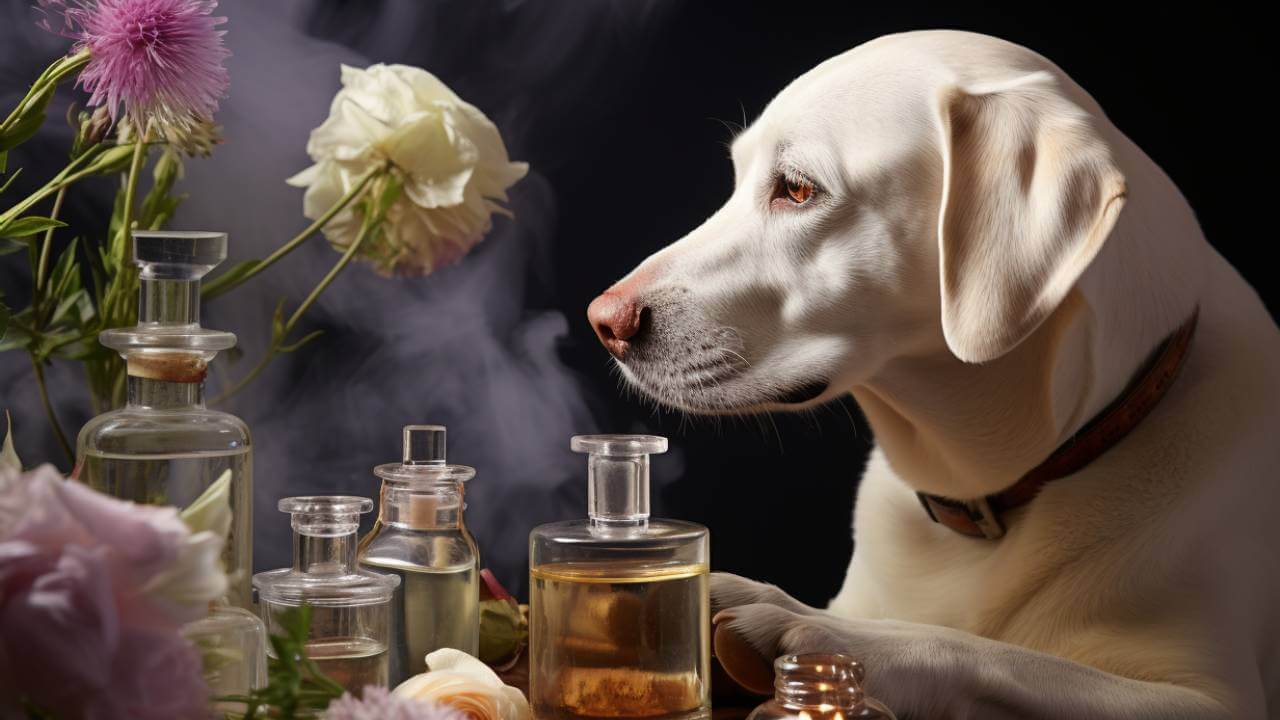In 2018, the essential oils market was valued at over $7 billion, highlighting their rising popularity in human and pet care. As dog owners increasingly turn to holistic approaches for their pets’ well-being, essential oils are a promising option. However, this trend raises an important question: Are essential oils safe for dogs?
This article navigates the complex intersection of natural wellness and canine health, aiming to uncover the truth behind using essential oils for dogs, guided by scientific research and expert insights.
What Are Essential Oils?
Essential oils are highly concentrated liquids derived from various plant parts, such as leaves, flowers, stems, and roots. These oils capture the aromatic compounds and therapeutic properties of the plants from which they are extracted. Essential oils are known for their potent and distinct fragrances. Various cultures have used them for their potential health and wellness benefits for centuries.
For those considering alternative treatments and health supports for their pets, exploring options like dog insurance can provide peace of mind and financial assistance for a range of therapies, including those involving essential oils.
Are Essential Oils Safe for Dogs?
While essential oils can offer soothing relief, repel insects, and even alleviate anxiety for dogs, their safe usage is paramount. Here’s an in-depth look at some safe essential oils for dogs and how to use them responsibly.
“They come in a wide range of scents, from soothing lavender and invigorating peppermint to earthy frankincense and zesty citrus. Use with a caution. I would definitely not experiment” – Veterinarian Mykhailo Ozmenchuk.
1. Lavender Oil
Lavender essential oil is celebrated for its calming effects and can significantly reduce anxiety and stress in dogs. Ideal for soothing skin conditions like itching and irritation, lavender oil, when diluted correctly and either applied topically or diffused, can create a peaceful atmosphere. This is particularly beneficial during stressful situations like thunderstorms or fireworks.
For topical application, dilute 1 drop of lavender oil with 10 drops of carrier oil. For diffusing, ensure the room is well-ventilated, and your dog can leave if it becomes uncomfortable.
2. Chamomile Oil
Chamomile essential oil is known for its gentle, soothing effects, particularly for skin irritations and allergies. Its calming properties also make it excellent for aiding relaxation in anxious pets.
Guidance: Apply chamomile oil topically after proper dilution or use it in a diffuser to promote a calming environment. Consult a vet for the correct dilution ratio based on your dog’s size and skin condition.
3. Frankincense Oil
Valued for its anti-inflammatory benefits, frankincense oil is particularly beneficial for older dogs with joint discomfort or arthritis. When used in aromatherapy, it also helps promote a sense of relaxation and well-being. Use carrier oil for topical application on areas away from the face. Discuss with your vet for advice on usage and dilution.
4. Cardamom Oil
Cardamom essential oil can support digestive health, alleviating symptoms like nausea and gas. However, using this oil sparingly and always diluted is crucial to avoid overwhelming your dog. Consultation Recommended: Consult your veterinarian for appropriate use and dilution before using it for digestive support.
5. Cedarwood Oil
Known for its insect-repelling qualities, cedarwood essential oil can naturally deter fleas and ticks when applied to your dog’s collar or bedding. Direct application on the skin is not recommended.
Precautions: Ensure proper dilution to prevent skin irritation and avoid contact with your dog’s skin directly.
6. Ginger Oil
Ginger essential oil is a go-to for easing motion sickness and nausea. Applying diluted ginger oil to your dog’s collar or bedding can help provide relief during car rides or for dogs prone to stomach upset. Always dilute ginger oil with a carrier oil and consult your vet for the best practices, especially if your dog has a sensitive stomach.
Key Takeaways for Safe Usage
- Always Dilute: Essential oils should be diluted with a carrier oil before use. A general guideline is 1 drop of essential oil to 10 drops of carrier oil, but this can vary.
- Consult a Veterinarian: Before introducing any essential oil, consult with a vet to ensure it’s safe for your dog’s specific health conditions and to receive personalized dilution and application instructions.
- Observe Your Dog: Watch for any signs of discomfort or allergic reactions. If any adverse effects are observed, discontinue use immediately and consult a vet.
Always consult your veterinarian or a professional experienced in pet aromatherapy to ensure you’re using these oils correctly and effectively to enhance your furry friend’s well-being.

The Risks of Essential Oils
While essential oils have gained popularity for their potential health benefits, it’s crucial to be aware of the risks associated with their use, especially around dogs. Here are some of the potential risks:
Skin Irritation: Undiluted essential oils can be harsh on your dog’s sensitive skin. Applying concentrated oils directly can lead to irritation, redness, itching, or even chemical burns.
Respiratory Distress: Dogs have a heightened sense of smell, and certain essential oils can be overwhelming or harmful when inhaled. Diffusing potent oils in an unventilated space may lead to respiratory distress, coughing, or sneezing in your dog. Ensure proper ventilation when using essential oil diffusers around your pet.
Oral Ingestion: Dogs may be tempted to ingest essential oils, especially those with appealing scents. Even small amounts of specific essential oils can lead to toxicity and adverse reactions.
Allergic Reactions: Like humans, dogs can have allergies or sensitivities to specific substances, including essential oils. Even oils considered safe for most dogs may cause allergic reactions.
Age and Health Considerations: Puppies, elderly dogs, and those with compromised immune systems may be more vulnerable to the adverse effects of essential oils. Exercise extra caution and consult your veterinarian for guidance if you have a dog in one of these categories.
While essential oils can benefit dogs when appropriately used, they are not without risks. Safety should be a priority when considering essential oils around your furry friend.
Are Some Essential Oils Toxic to Dogs?
Some essential oils are toxic to dogs and should be avoided altogether. These oils can cause various adverse reactions, from mild symptoms to severe toxicity. Pet owners must be aware of these toxic essential oils and ensure they are not used around dogs. Here are some essential oils that are known to be toxic to dogs:
- Tea Tree Oil: Tea tree oil is highly toxic to dogs and can cause symptoms like vomiting, diarrhea, lethargy, drooling, and, in severe cases, tremors and seizures. Ingesting or topical exposure to undiluted tea tree oil can harm dogs.
- Pennyroyal Oil: Pennyroyal oil is a potent toxin for dogs and should be avoided entirely. Even small amounts of pennyroyal oil can lead to liver and kidney damage, seizures, and even death.
- Eucalyptus Oil: Eucalyptus oil contains compounds that can harm dogs when ingested or inhaled in concentrated forms. Symptoms of eucalyptus oil toxicity in dogs include drooling, vomiting, diarrhea, and difficulty breathing.
- Cinnamon Oil: Cinnamon oil contains compounds that can irritate a dog’s skin and mucous membranes. Ingesting concentrated cinnamon oil can lead to symptoms like nausea, vomiting, diarrhea, and liver damage.
Exercise extreme caution when using essential oils around dogs. Even oils considered safe should be used with care and proper dilution.
Always store essential oils out of your dog’s reach, and if you suspect your dog has ingested or been exposed to a toxic essential oil, seek immediate veterinary assistance.

Essential oils can be used safely for dogs, but it’s crucial to exercise caution and be well-informed. Certain essential oils can benefit your furry friend when used correctly and in moderation.
However, always consult your veterinarian before introducing essential oils into your dog’s routine. Safety should be the top priority to ensure your dog enjoys the benefits of these natural remedies without any harm.

FAQs
How can I safely apply essential oils to my dog?
To safely apply essential oils to your dog, dilute the oil with a carrier oil like coconut or olive oil at a ratio of one drop to ten drops of carrier oil. First, perform a patch test on a small area and observe for any adverse reactions. Never apply it near the face, eyes, or genitals.
What are the signs of essential oil poisoning in dogs?
Drooling, vomiting, tremors, difficulty breathing, and lethargy are signs of essential oil poisoning in dogs. If you notice these symptoms and suspect your dog has been exposed to toxic essential oils, contact your veterinarian immediately.
Can I use a diffuser with essential oils around my dog?
You can use a diffuser with essential oils around dogs but with caution. Avoid using high concentrations and ensure the room is well-ventilated. Some essential oils, like tea tree, peppermint, and eucalyptus, can be toxic to dogs, so it’s vital to choose dog-safe options and consult a veterinarian beforehand.
How can I choose the right essential oils for my dog?
Choose pure, high-quality oils that are labeled as safe for pets. Research or consult with a vet to find oils that can address specific concerns, such as lavender for anxiety or frankincense for skin issues. Always prioritize your dog’s health and safety in your selection.
Are there any essential oils I should completely avoid using around my dog?
Some essential oils should be avoided due to their toxicity to dogs, including tea tree, peppermint, cinnamon, citrus, pine, wintergreen, and ylang-ylang. Always research and consult with a veterinarian before introducing any new essential oil into your home.
References & Additional Resources on Essential Oils & Dogs:
- For the scientific backing and veterinary applications of essential oils, explore the Use of Essential Oils in Veterinary Medicine to Combat Bacterial and Fungal Infections.
- The FDA Poisonous Plant Database offers insights into plants and their derivatives that should be used cautiously or avoided in pet care.
- Those interested in natural pest prevention methods may find the essential oil pharmaceuticals for killing ectoparasites in dogs, particularly enlightening.
- For an overview of the potential and limitations of Aromatherapy With Essential Oils in pet cancer treatment.






I think dogs have a very sensitive sense of smell and an excessive amount of concentrated smells will not benefit them
Essential oils are a must in our home, but I’ve heard mixed things about using them around pets. How can we safely enjoy them without harming our furry friends? 🌿🐶
I’ve been curious about using essential oils around my dog, but safety is my top priority